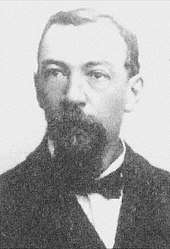Schalk Willem Burger
Schalk Willem Burger (6 September 1852 – 5 December 1918) was a South African military leader, lawyer, politician, and statesman who was acting president of the South African Republic from 1900 to 1902, whilst Paul Kruger was in exile.[1]
Schalk Willem Burger | |
|---|---|
 | |
| 6th President of the South African Republic | |
| In office 11 September 1900 – 31 May 1902 | |
| Preceded by | Paul Kruger |
| Succeeded by | Office abolished |
| Personal details | |
| Born | 6 September 1852 Lydenburg, Transvaal |
| Died | 5 December 1918 (aged 66) Goedgedacht, South Africa |
| Spouse(s) | Alida C. De Villiers |
| Military service | |
| Allegiance | |
| Commands | Lydenburg Commando |
| Wars | |
Military service
He served in a number of military conflicts such as the Sekhukhune Wars of 1876, and later during the First Boer War of 1881, he served as acting field cornet.
He was elected as commandant of the Lydenburg Commando in 1885. When the Second Boer War started, he served as commandant-general in a number of military conflicts, including the battle of Spion Kop and battle of Modder River on 30 October 1899.
Political career
As a politician, he was described as "enlightened and shrewd" and it was reported that he rivaled Paul Kruger in his influence over his countrymen.[2] After the battle of Spion Kop, due to illness, he withdrew from the fighting and pursued his political career once more. He was elected to the Volksraad in 1887, later serving as chairman.
In March 1900, following the death of Piet Joubert, he was elected Vice President under President Paul Kruger. In September 1900, he succeeded Kruger as state president, after Kruger had left for Europe.[3]
During the military tribunal in May 1901, he advocated a cessation of hostilities, but his proposal was strongly opposed by President Marthinus Theunis Steyn of the Orange Free State. Burger remained president until the Treaty of Vereeniging on 31 May 1902.
Following the end of the war, Burger visited Europe, including The Hague.[4]
In Rotterdam, in the Afrikaanderwijk, the Schalk Burgerstraat was named after him.
He died in 1918 at Goedgedacht, near Krugerspos.
References
- Nathan, Manfred (1937). The Voortrekkers of South Africa: From the Earliest Times to the Foundation of the Republics. Gordon and Gotch, ltd.
- http://hdl.handle.net/10394/14081 Die ontstaan en ontwikkeling van die amp van die staatspresident in die Zuid-Afrikaansche Republiek, 1858-1902, "Du Plessis_JS_Chapter11.pdf" (2.125Mb)
- "Latest intelligence - The Boer leaders in Europe". The Times (36920). London. 8 November 1902. p. 7.